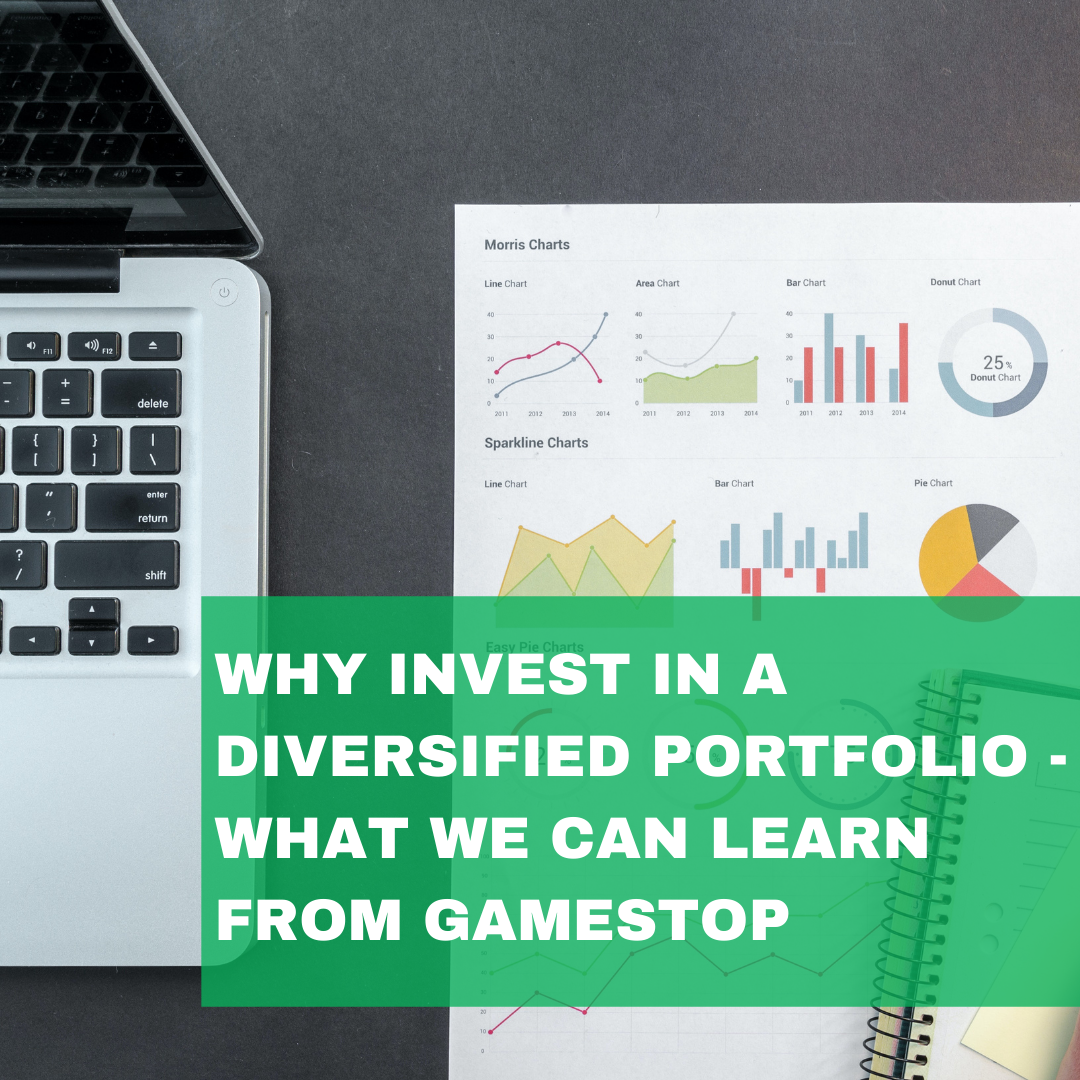
Why invest through a diversified portfolio?
The below write-up was written before the GameStop saga, so we’d like to spend a minute to address that as it is relevant to what we’re saying below.
In a nutshell, GameStop was a heavily shorted company (where investors believe the stock will do poorly, sell the shares in order to buy them back cheaper) but few individual investors noticed that the company was much better positioned than the stock was portraying and early last year (2020) bought into the company. Very recently it was widely shared in the Reddit forum where over a million people were reading and talking about it. They jumped on it, bought more, and forced the short-sellers to also buy it back making the price jump much higher. That brought even more attention to the stock and even more investors jumped in (WallStreetBets forum on Reddit now has over 8 million members), bringing the stock trading at $4 sometime last year to over $400 at one point in late January. The thought here is that even the original investor on Reddit that was sharing his thesis believed the stock was undervalued at $4 and expected a double or triple of it when the value was realized, but not what happened. The stock temporarily did a 100X from $4 to $400 (WOW) and brought the attention of 12 year olds as well as 112 year olds, and as of the writing of this trading below $100. So, what’s the point? The point that we’ll make below as well, is that this is NOT investing. The stock at $400/share had nothing to do with what the company (GameStop) was doing, absolutely nothing. The two were completely disconnected.
From WallStreetBets forum on Reddit:

The above-pasted sentiment shared on Reddit (either “Food Stamps or a Lambo”) is not how investing works or should work. Many unknowingly will get hurt and potentially stay away from the stock market, even though that is the best thing for them long term. Sticking it to the ‘suits’, as Reddit people keep saying, is not done by bankrupting yourself, but by investing prudently, understanding what you’re doing, and diversifying your risks – or if still want to do it only do so with money you’re OK to lose – like a lottery ticket. Hope the below makes even more sense after these last couple weeks of madness in the stock market.
Here at InvestEd, we always strive to bring you the latest ideas in financial planning and investment strategies, paired with financial education. All of our clients know that we help them invest through a carefully thought-out portfolio that is designed to best achieve their goals, but many others (including sometimes our own clients) may ask, “What is a portfolio and why do we invest like that?” or “Why don’t we just select the best stocks and invest there?”
Starting with the last question, the answer is that we, and almost every honest financial planner, don’t know what the best stocks will be, going forward. There’s only ‘past performance’ of what happened, or ‘in hindsight and after the fact’. Most people didn’t hear about GameStop before it’s catapultic rise to the couple hundreds or more per share, very few invested early last year. Anyone can speculate what may happen with this or that stock and invest like that, but a professional should take a more thoughtful approach, remove unnecessary risk and try to create a somewhat predictable path for the client’s hard-earned money. In hindsight, one could say that he should have taken all his money and put it into Tesla or Bitcoin, but those two or similar like them could have crashed or worse as well, and many similar stocks have done so. You may not remember, but many bought into Lehman Brothers or Bear Stearns in 2008-09 thinking that these two major financial institutions were very cheap during the crisis and could have only gone up. Most were surprised when those two were allowed to go bankrupt or bought for pennies, and all that was invested in them was lost. See, in hindsight you only see the ‘great’ companies you could have invested in that are now up but forget the other ones you also liked but are now down or out. Selective memory works in finance too, just like in other parts of your life.
Now, if you don’t want to live on the edge of your seat and aim for that great return but with the high risk of losing it most or all (think GameStop), then, your money should be diversified. Diversification is known in finance as the only ‘free lunch’ if there are any of those. And that is the main concept of a portfolio. We build portfolios knowing well what we don’t know well, that is which stock will go ‘bananas’ and which one will go bankrupt, thus we buy them all. A well-diversified portfolio that we build has over 10,000 stocks and bonds in them, diversified not only in large, mid or small companies, but also into world regions and sectors of the economies. You’d be likely to have a hand in the largest companies of the world you know and use up to the smallest ones in far parts of the world you’ve never heard of. Why would you say we do that? Because growth and investment performance can come from anywhere and anytime, and we’d like to be there when it happens.
Besides just being cool and showing off to your friends that you have investments in a foreign company that you can’t even pronounce, there are performance benefits of a portfolio and diversification. Without getting into too much finance, putting together companies that are unrelated in business ventures, in geographical areas they operate, or clients they serve, helps the portfolio to soften the risk or volatility (the ups and downs) of your investments. In addition, by limiting our downside we’re also increasing our upside, as remember, a 50% drop requires a 100% increase to go back where it was. If we limit that drop we won’t require that much of an increase to go back and surpass our prior highs. We remove the company-specific risk; that is if one company in our portfolio goes bankrupt, we won’t go bankrupt as well. In short, diversification increases performance while also decreasing risk, thus the ‘free lunch’ concept. And, you know, even billionaires like ‘free lunches’.
But the portfolio also has behavioral benefits. What are those you may say and are those edible too? No, you can’t eat them, but they definitely help with digestion ☺. These behavioral benefits are visible when you are more relaxed knowing that you own them all, but not one company can affect you anymore. You’re invested in all of them, but don’t necessarily know them by name to worry over their individual performance. If you owned those stocks individually you’d watch over them, worry when down, excited when up, and then worried again when down. In the portfolio set up, you don’t get to see those individual company performances, saving yourself ‘indigestion’ & stress issues while getting the benefits of being and staying invested. If you’ve ever done individual stock investing, you’d know this benefit is the largest of all.
Now, are we saying that the ‘portfolio’ is the best thing since sliced bread? Well, not really, but you can slice it as thin or as thick as you’d like… That is, the portfolio can be customized to you, your goals, your time horizon of those goals, and even your risk tolerance. And we do such with every client, we try to understand why they’re investing for and when is the money needed and then build a portfolio that is best suited to reach that goal without taking unnecessary risk. This makes it possible to have several portfolios that have different criteria based on your short, mid, or long-term goals. This customization is discussed with your financial planner or advisor to make sure all the above factors are taken into consideration.
Are we there yet? Almost, just a few last points to bring it home. The last few benefits to a portfolio relate to taxes & reducing unnecessary ones, having portfolios that match with your social values, and also building them as low cost as possible. Now, who wants to pay more taxes than they have to? Well, many people do so unknowingly. Using the portfolios and also the different tax-advantaged accounts, like IRAs we can place assets in such a way that reduces current taxes and allows the money to grow tax-deferred. In addition, using what’s known as ‘tax-loss harvesting’ we can reduce future taxes on gains, again another feature of using a portfolio versus buying single stocks. Portfolios also get rebalanced, in a tax-efficient manner, to maintain the same risk you wanted, something that cannot be done if you own just one stock.
Portfolios can now also match your values, as SRI (Socially Responsible Investing) becomes more available. You can invest while also aiming for better environmental, social, and governance behavior from the companies that you’re invested in. That’s still in the first innings, but companies are already recognizing such trends and making necessary changes to their operations to satisfy this newly heightened awareness.
Lastly, how would you like all of the above benefits while also paying 1/10th of the previous costs? Our portfolios are built with passive ETFs, which have grown exponentially these last 15-20 years while taking major market share from the ‘old-guard’ mutual funds of the 1970s, primarily because of the mentioned above benefits.
Building tax-efficient ETF portfolios with all the above benefits, while also paying on average only 10% of the cost of the competing mutual funds is the definition of a revolution, in finance anyways. And once you realize you can’t beat the market or find that unicorn stock (or only after it has moved up by a lot), you’ll just fall into the portfolio’s lap, revolutionizing the way you manage your money for your future goals.





